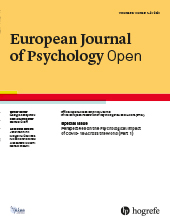Trust in Authorities and Demographic Factors Affect Vaccine Acceptance During the COVID-19 Pandemic in Cyprus
Abstract
Abstract. The COVID-19 pandemic has had a devastating impact on all aspects of human life. Accurately measuring vaccine acceptance and understanding the factors that influence vaccine attitudes and behaviors is crucial to designing public-health interventions to reduce the impact of COVID-19 through vaccinations. The current study adapted the vaccine acceptance scale (Sarathchandra et al., 2018) to the Greek language and assessed the relationship between key components of vaccine acceptance to COVID-19 vaccine beliefs and attitudes, personal and family vaccination history and attitudes, and demographic variables (age, sex, education, and having children). The adapted vaccine acceptance instrument was found to have high internal consistency reliability. Further analyses indicated that younger and less-educated individuals are more vaccine-hesitant, and that vaccine acceptance is influenced by trust in authorities. These findings may have implications for understanding vaccine hesitancy and for the design and implementation of vaccine-related public health policies.
References
(2020). Determinants of COVID-19 Vaccine acceptance in Saudi Arabia: A web-based national survey. Journal of Multidisciplinary Healthcare, 13, 1657–1663. https://doi.org/10.2147/JMDH.S276771
(2020). Challenges in creating herd immunity to SARS-CoV-2 infection by mass vaccination. The Lancet, 396(10263), 1614–1616. https://doi.org/10.1016/S0140-6736(20)32318-7
. (2021a January). Vaccination Portal to be made available to citizens over the age of 88 as of 27 January. https://www.pio.gov.cy/coronavirus/uploads/2612021_vaccinationsover88yo_EN.pdf
. (2021b July). Vaccination Portal to be made available to citizens over the age of 88 as of 27 January. https://www.pio.gov.cy/coronavirus/uploads/01072021_vaccinationsEN.pdf
(2020). Mapping global trends in vaccine confidence and investigating barriers to vaccine uptake: A large-scale retrospective temporal modelling study. The Lancet, 396(10255), 898–908.
(2019). Determinants of vaccine hesitancy in Switzerland: Study protocol of a mixed-methods national research programme. BMJ Open, 9(11), Article e032218.
(2017). Crisis of trust: Socio-economic determinants of Europeans’ confidence in government. European Union Politics, 18(4), 511–535. https://doi.org/10.1177/1465116517723499
(2021). Coronavirus risk perception and compliance with social distancing measures in a sample of young adults: Evidence from Switzerland. PLoS One, 16(2), 1–13. https://doi.org/10.1371/journal.pone.0247447
(2021). COVID-19 and vaccine hesitancy: A longitudinal study. PLoS One, 16(4), 1–12. https://doi.org/10.1371/journal.pone.0250123
(2016). Public misunderstanding of science? Reframing the problem of vaccine hesitancy. Perspectives on Science, 24(5), 552–581. https://doi.org/10.1162/POSC_a_00223
(2021). Vaccine hesitancy: Public trust, expertise, and the war on science. University of Pittsburgh Press.
(2021). Safety of COVID-19 vaccines administered in the EU: Should we be concerned? Toxicology Reports, 8, 871–879. https://doi.org/10.1016/j.toxrep.2021.04.003
(2014). Sex-based biology and the rational design of influenza vaccination strategies. The Journal of infectious diseases, 209(suppl_3), S114–S119.
(2007). Determinants of influenza and pneumococcal vaccination in elderly people: A systematic review. Public Health, 121(10), 742–751. https://doi.org/10.1016/j.puhe.2007.02.011
(2021). Trust in authorities and demographic factors affect vaccine acceptance during the COVID-19 pandemic in Cyprus. https://doi.org/10.17605/OSF.IO/QMVTJ
(2018). Measuring trust in vaccination: A systematic review. Human Vaccines and Immunotherapeutics, 14(7), 1599–1609. https://doi.org/10.1080/21645515.2018.1459252
(2021). A global survey of potential acceptance of a COVID-19 vaccine. Nature Medicine, 27(2), 225–228. https://doi.org/10.1038/s41591-020-1124-9
(2020). Hesitant or not? The association of age, gender, and education with potential acceptance of a COVID-19 vaccine: A country-level analysis. Journal of Health Communication, 25(10), 799–807. https://doi.org/10.1080/10810730.2020.1868630
(2015). Vaccine hesitancy: Definition, scope and determinants. Vaccine, 33(34), 4161–4164. https://doi.org/10.1016/j.vaccine.2015.04.036
(2020). The bumpy road to achieve herd immunity in COVID-19. Journal of Immunoassay and Immunochemistry, 41(6), 928–945. https://doi.org/10.1080/15321819.2020.1833919
(2020). Once we have it, will we use it? A European survey on willingness to be vaccinated against COVID-19. European Journal of Health Economics, 21(7), 977–982. https://doi.org/10.1007/s10198-020-01208-6
(2011). Vaccines and your child: Separating fact from fiction. Columbia University Press.
(2018). A survey instrument for measuring vaccine acceptance. Preventive Medicine, 109, 1–7. https://doi.org/10.1016/j.ypmed.2018.01.006
(2020). The public’s role in COVID-19 vaccination: Human-centered recommendations to enhance pandemic vaccine awareness, access, and acceptance in the United States. Vaccine, https://doi.org/10.1016/j.vaccine.2020.10.059
(2009). Theory of test translation error. International Journal of Testing, 9(2), 78–91. https://doi.org/10.1080/15305050902880835
. (2021). Jamovi. (Version 1.6) [Computer Software]. https://www.jamovi.org
(2003). Age and gender differences in risk-taking behaviour as an explanation for high incidence of motor vehicle crashes as a driver in young males. Injury Control and Safety Promotion, 10(3), 123–130. https://doi.org/10.1076/icsp.10.3.123.14560
. (2020, December). FDA takes key action in fight against COVID-19 by issuing emergency use authorization for first COVID-19 vaccine. https://www.fda.gov/news-events/press-announcements/fda-takes-key-action-fight-against-covid-19-issuing-emergency-use-authorization-first-covid-19
(2006). Translating tests: Some practical guidelines. European Psychologist, 1(2), 89–99. https://doi.org/10.1027/1016-9040.1.2.89
(2014). Attitudes to vaccination: A critical review. Social Science & Medicine, 112, 1–11.



